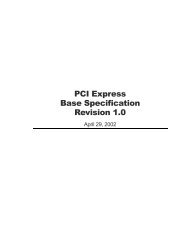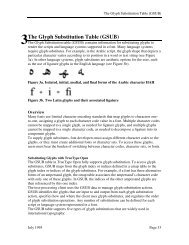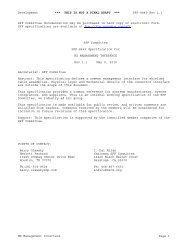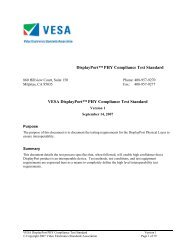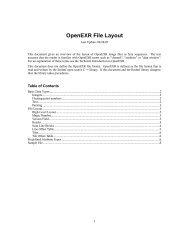- Page 1 and 2:
dpANSProjectT10/1236-DRevision 2018
- Page 3:
DraftANSI (r)NCITS.351:200xAmerican
- Page 6 and 7:
T10/1236-D Revision 20 18 July 2001
- Page 8 and 9:
T10/1236-D Revision 20 18 July 2001
- Page 10 and 11:
T10/1236-D Revision 20 18 July 2001
- Page 12 and 13:
T10/1236-D Revision 20 18 July 2001
- Page 14 and 15:
T10/1236-D Revision 20 18 July 2001
- Page 16 and 17:
T10/1236-D Revision 20 18 July 2001
- Page 18 and 19:
T10/1236-D Revision 20 18 July 2001
- Page 20 and 21:
T10/1236-D Revision 20 18 July 2001
- Page 22 and 23:
T10/1236-D Revision 20 18 July 2001
- Page 24 and 25:
T10/1236-D Revision 20 18 July 2001
- Page 26 and 27:
T10/1236-D Revision 20 18 July 2001
- Page 28 and 29:
T10/1236-D Revision 20 18 July 2001
- Page 30 and 31:
T10/1236-D Revision 20 18 July 2001
- Page 32 and 33:
T10/1236-D Revision 20 18 July 2001
- Page 34 and 35:
T10/1236-D Revision 20 18 July 2001
- Page 36 and 37:
T10/1236-D Revision 20 18 July 2001
- Page 38 and 39:
T10/1236-D Revision 20 18 July 2001
- Page 40 and 41:
T10/1236-D Revision 20 18 July 2001
- Page 42 and 43:
T10/1236-D Revision 20 18 July 2001
- Page 44 and 45:
T10/1236-D Revision 20 18 July 2001
- Page 46 and 47:
T10/1236-D Revision 20 18 July 2001
- Page 48 and 49:
T10/1236-D Revision 20 18 July 2001
- Page 50 and 51:
T10/1236-D Revision 20 18 July 2001
- Page 52 and 53:
T10/1236-D Revision 20 18 July 2001
- Page 54 and 55:
T10/1236-D Revision 20 18 July 2001
- Page 56 and 57:
T10/1236-D Revision 20 18 July 2001
- Page 58 and 59:
T10/1236-D Revision 20 18 July 2001
- Page 60 and 61:
T10/1236-D Revision 20 18 July 2001
- Page 62 and 63:
T10/1236-D Revision 20 18 July 2001
- Page 64 and 65:
T10/1236-D Revision 20 18 July 2001
- Page 66 and 67:
T10/1236-D Revision 20 18 July 2001
- Page 68 and 69:
T10/1236-D Revision 20 18 July 2001
- Page 70 and 71:
T10/1236-D Revision 20 18 July 2001
- Page 72 and 73:
T10/1236-D Revision 20 18 July 2001
- Page 74 and 75:
T10/1236-D Revision 20 18 July 2001
- Page 76 and 77:
T10/1236-D Revision 20 18 July 2001
- Page 78 and 79:
T10/1236-D Revision 20 18 July 2001
- Page 80 and 81:
T10/1236-D Revision 20 18 July 2001
- Page 82 and 83:
T10/1236-D Revision 20 18 July 2001
- Page 84 and 85:
T10/1236-D Revision 20 18 July 2001
- Page 86 and 87:
T10/1236-D Revision 20 18 July 2001
- Page 88 and 89:
T10/1236-D Revision 20 18 July 2001
- Page 90 and 91:
T10/1236-D Revision 20 18 July 2001
- Page 92 and 93:
T10/1236-D Revision 20 18 July 2001
- Page 94 and 95:
T10/1236-D Revision 20 18 July 2001
- Page 96 and 97:
T10/1236-D Revision 20 18 July 2001
- Page 98 and 99:
T10/1236-D Revision 20 18 July 2001
- Page 100 and 101:
T10/1236-D Revision 20 18 July 2001
- Page 102 and 103:
T10/1236-D Revision 20 18 July 2001
- Page 104 and 105:
T10/1236-D Revision 20 18 July 2001
- Page 106 and 107:
T10/1236-D Revision 20 18 July 2001
- Page 108 and 109:
T10/1236-D Revision 20 18 July 2001
- Page 110 and 111:
T10/1236-D Revision 20 18 July 2001
- Page 112 and 113:
T10/1236-D Revision 20 18 July 2001
- Page 114 and 115:
T10/1236-D Revision 20 18 July 2001
- Page 116 and 117:
T10/1236-D Revision 20 18 July 2001
- Page 118 and 119:
T10/1236-D Revision 20 18 July 2001
- Page 120 and 121:
T10/1236-D Revision 20 18 July 2001
- Page 122 and 123:
T10/1236-D Revision 20 18 July 2001
- Page 124 and 125:
T10/1236-D Revision 20 18 July 2001
- Page 126 and 127:
T10/1236-D Revision 20 18 July 2001
- Page 128 and 129:
T10/1236-D Revision 20 18 July 2001
- Page 130 and 131:
T10/1236-D Revision 20 18 July 2001
- Page 132 and 133:
T10/1236-D Revision 20 18 July 2001
- Page 134 and 135:
T10/1236-D Revision 20 18 July 2001
- Page 136 and 137:
T10/1236-D Revision 20 18 July 2001
- Page 138 and 139:
T10/1236-D Revision 20 18 July 2001
- Page 140 and 141:
T10/1236-D Revision 20 18 July 2001
- Page 142 and 143:
T10/1236-D Revision 20 18 July 2001
- Page 144 and 145:
T10/1236-D Revision 20 18 July 2001
- Page 146 and 147:
T10/1236-D Revision 20 18 July 2001
- Page 148 and 149:
T10/1236-D Revision 20 18 July 2001
- Page 150 and 151:
T10/1236-D Revision 20 18 July 2001
- Page 152 and 153:
T10/1236-D Revision 20 18 July 2001
- Page 154 and 155:
T10/1236-D Revision 20 18 July 2001
- Page 156 and 157:
T10/1236-D Revision 20 18 July 2001
- Page 158 and 159:
T10/1236-D Revision 20 18 July 2001
- Page 160 and 161:
T10/1236-D Revision 20 18 July 2001
- Page 162 and 163:
T10/1236-D Revision 20 18 July 2001
- Page 164 and 165:
T10/1236-D Revision 20 18 July 2001
- Page 166 and 167:
T10/1236-D Revision 20 18 July 2001
- Page 168 and 169:
T10/1236-D Revision 20 18 July 2001
- Page 170 and 171:
T10/1236-D Revision 20 18 July 2001
- Page 172 and 173:
T10/1236-D Revision 20 18 July 2001
- Page 174 and 175:
T10/1236-D Revision 20 18 July 2001
- Page 176 and 177:
T10/1236-D Revision 20 18 July 2001
- Page 178 and 179:
T10/1236-D Revision 20 18 July 2001
- Page 180 and 181:
T10/1236-D Revision 20 18 July 2001
- Page 182 and 183:
T10/1236-D Revision 20 18 July 2001
- Page 184 and 185:
T10/1236-D Revision 20 18 July 2001
- Page 186 and 187:
T10/1236-D Revision 20 18 July 2001
- Page 188 and 189:
T10/1236-D Revision 20 18 July 2001
- Page 190 and 191:
T10/1236-D Revision 20 18 July 2001
- Page 192 and 193:
T10/1236-D Revision 20 18 July 2001
- Page 194 and 195:
T10/1236-D Revision 20 18 July 2001
- Page 196 and 197: T10/1236-D Revision 20 18 July 2001
- Page 198 and 199: T10/1236-D Revision 20 18 July 2001
- Page 200 and 201: T10/1236-D Revision 20 18 July 2001
- Page 202 and 203: T10/1236-D Revision 20 18 July 2001
- Page 204 and 205: T10/1236-D Revision 20 18 July 2001
- Page 206 and 207: T10/1236-D Revision 20 18 July 2001
- Page 208 and 209: T10/1236-D Revision 20 18 July 2001
- Page 210 and 211: T10/1236-D Revision 20 18 July 2001
- Page 212 and 213: T10/1236-D Revision 20 18 July 2001
- Page 214 and 215: T10/1236-D Revision 20 18 July 2001
- Page 216 and 217: T10/1236-D Revision 20 18 July 2001
- Page 218 and 219: T10/1236-D Revision 20 18 July 2001
- Page 220 and 221: T10/1236-D Revision 20 18 July 2001
- Page 222 and 223: T10/1236-D Revision 20 18 July 2001
- Page 224 and 225: T10/1236-D Revision 20 18 July 2001
- Page 226 and 227: T10/1236-D Revision 20 18 July 2001
- Page 228 and 229: T10/1236-D Revision 20 18 July 2001
- Page 230 and 231: T10/1236-D Revision 20 18 July 2001
- Page 232 and 233: T10/1236-D Revision 20 18 July 2001
- Page 234 and 235: T10/1236-D Revision 20 18 July 2001
- Page 236 and 237: T10/1236-D Revision 20 18 July 2001
- Page 238 and 239: T10/1236-D Revision 20 18 July 2001
- Page 240 and 241: T10/1236-D Revision 20 18 July 2001
- Page 242 and 243: T10/1236-D Revision 20 18 July 2001
- Page 244 and 245: T10/1236-D Revision 20 18 July 2001
- Page 248 and 249: T10/1236-D Revision 20 18 July 2001
- Page 250 and 251: T10/1236-D Revision 20 18 July 2001
- Page 252 and 253: T10/1236-D Revision 20 18 July 2001
- Page 254 and 255: T10/1236-D Revision 20 18 July 2001
- Page 256 and 257: T10/1236-D Revision 20 18 July 2001
- Page 258 and 259: T10/1236-D Revision 20 18 July 2001
- Page 260 and 261: T10/1236-D Revision 20 18 July 2001
- Page 262 and 263: T10/1236-D Revision 20 18 July 2001
- Page 264 and 265: T10/1236-D Revision 20 18 July 2001
- Page 266 and 267: T10/1236-D Revision 20 18 July 2001
- Page 268 and 269: T10/1236-D Revision 20 18 July 2001
- Page 270 and 271: T10/1236-D Revision 20 18 July 2001
- Page 272 and 273: T10/1236-D Revision 20 18 July 2001
- Page 274 and 275: T10/1236-D Revision 20 18 July 2001
- Page 276 and 277: T10/1236-D Revision 20 18 July 2001
- Page 278 and 279: T10/1236-D Revision 20 18 July 2001
- Page 280 and 281: T10/1236-D Revision 20 18 July 2001
- Page 282 and 283: T10/1236-D Revision 20 18 July 2001
- Page 284 and 285: T10/1236-D Revision 20 18 July 2001
- Page 286 and 287: T10/1236-D Revision 20 18 July 2001
- Page 288 and 289: T10/1236-D Revision 20 18 July 2001
- Page 290 and 291: T10/1236-D Revision 20 18 July 2001
- Page 292 and 293: T10/1236-D Revision 20 18 July 2001



![[MS-DFSRH]: DFS Replication Helper Protocol Specification](https://img.yumpu.com/51326226/1/190x245/ms-dfsrh-dfs-replication-helper-protocol-specification.jpg?quality=85)
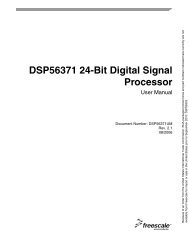
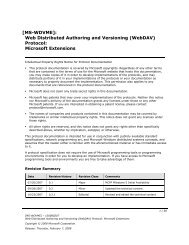
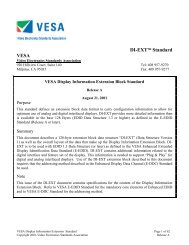
![[MS-VDS]: Virtual Disk Service (VDS) Protocol Specification](https://img.yumpu.com/50743814/1/190x245/ms-vds-virtual-disk-service-vds-protocol-specification.jpg?quality=85)
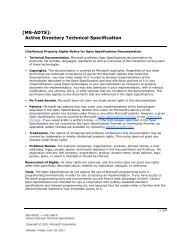
![[MS-GPSI]: Group Policy: Software Installation Protocol Extension](https://img.yumpu.com/50703911/1/190x245/ms-gpsi-group-policy-software-installation-protocol-extension.jpg?quality=85)
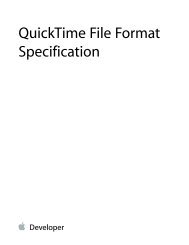
![[MS-GPPREF]: Group Policy: Preferences Extension Data Structure](https://img.yumpu.com/50206932/1/190x245/ms-gppref-group-policy-preferences-extension-data-structure.jpg?quality=85)
